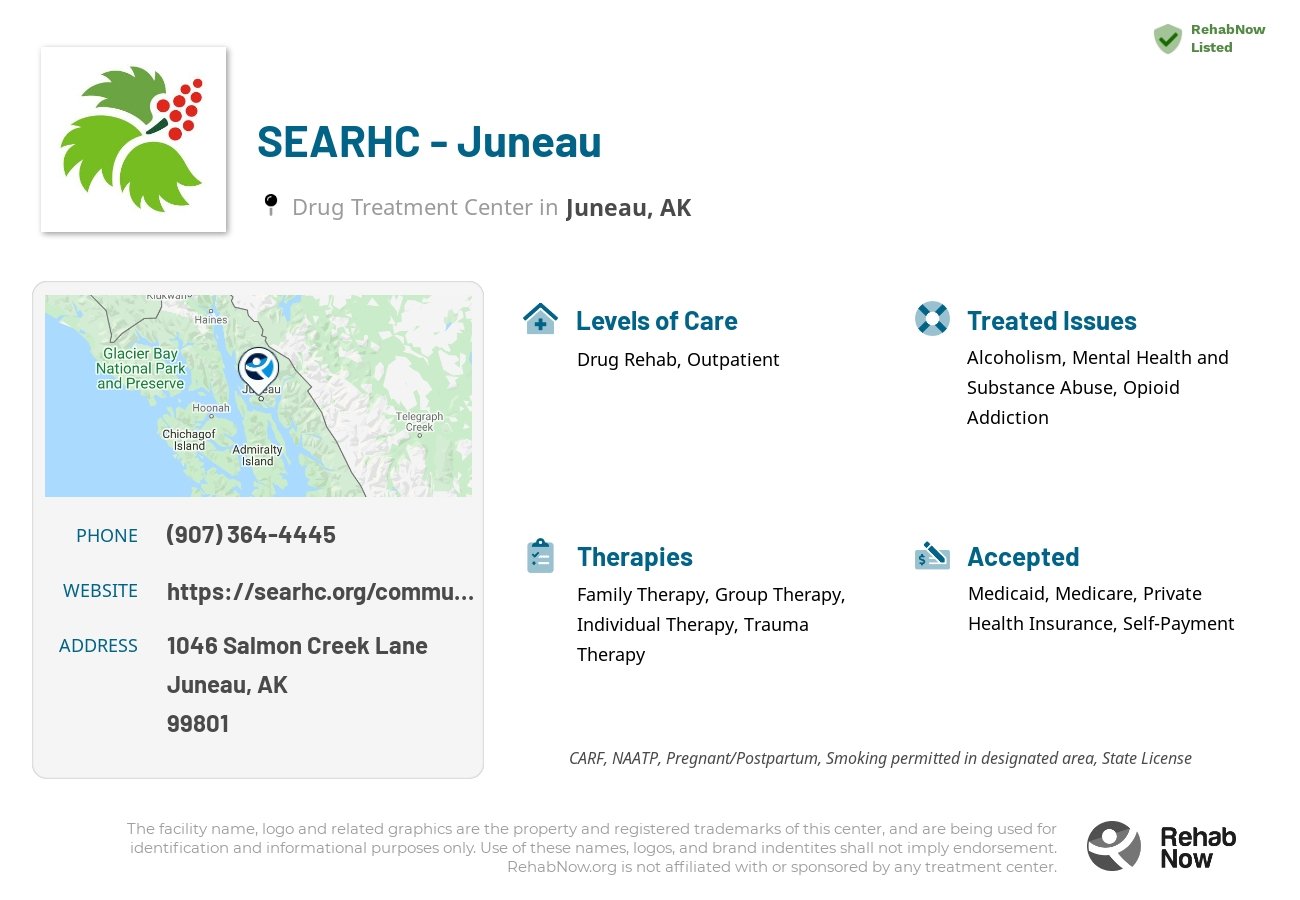SEARHC - Juneau
Drug Rehab Center in Juneau, Alaska
SEARHC - Juneau is a comprehensive healthcare provider offering medical, dental, mental and addiction/substance abuse treatment with a ‘whole person’ approach, and is accredited by CARF, recognized by SAMHSA, and has earned several awards from the National Committee for Quality Assurance.
About
SEARHC - Juneau is a comprehensive healthcare provider based in Alaska that offers a range of services to individuals and their families in the community. With over 40 years of experience, they provide medical, dental and mental healthcare, including addiction and substance abuse treatment. SEARHC - Juneau operates with a ‘whole person’ approach, offering individualized treatment plans and addressing the physical, spiritual, mental, and emotional needs of each patient.
At SEARHC - Juneau, they focus on helping people with addiction and substance abuse to find improved physical and mental well-being. They offer a range of evidence-based treatment techniques including cognitive behavioral therapy, motivational interviewing, and trauma-informed care. They recognize that the complex nature of addiction requires an integrated approach to treatment, so they strive to create an environment of healing and understanding for patients to explore their recovery journey.
SEARHC - Juneau is accredited by The Commission on Accreditation of Rehabilitation Facilities (CARF). They are also recognized by the Substance Abuse and Mental Health Services Administration (SAMHSA) and have earned several awards from the National Committee for Quality Assurance. Furthermore, they provide mental health services for people facing issues such as depression, anxiety, and grief, as well as educational support for patients and their families. They are committed to providing the highest quality of care to all of their patients.
Genders
Ages
Modality
Additional
Conditions and Issues Treated
Within the past decade, opioid addiction has become a nationwide epidemic. The United States hosts one of the world’s highest rates of opioid use or abuse and has one of the highest rates of opioid-related deaths. In the United States, opioid drugs are classified as Schedule II-IV controlled substances due to their highly addictive properties and potential for abuse. These include morphine, opium, heroin, oxycodone, hydrocodone, methadone, and fentanyl. Physicians usually prescribe opioids to help control pain.
Over time, opioid users develop a tolerance for the drugs, which makes it difficult, if not impossible, to function without them. In turn, opioid users often resort to illicit means of obtaining the drugs. These means can include drug dealers, friends, and family members who do not have legitimate prescriptions for the drugs. Opioid addiction can quickly lead to heroin use, especially those seeking more intense highs than prescription opioids offer. Due to the high risk of overdose, heroin users are at a much higher risk for illness and death.
Levels of Care Offered
This center offers a variety of custom treatment tailored to individual recovery. Currently available are Drug Rehab, Outpatient, with additional therapies available as listed below.
An outpatient treatment program is set up to help with alcohol or drug addiction or a co-occurring disorder. The treatment must attend the treatment facility for their therapy and other programs but return home each night. The frequency of mandatory attendance decreases after much of the treatment program is complete. The treatment programs are monitored by the treatment facility and case managers who work for a judge or judge’s office. A treatment program may be performed out of a treatment facility, treatment clinic, or treatment center.
The benefits of outpatient treatment programs are many. One of the most beneficial treatment programs is that it allows treatment for clients who cannot afford or may not be able to attend treatment at a treatment facility, treatment center, or treatment clinic full-time. Another benefit of treatment programs is that they reduce crime rates because treatment allows people to treat their addiction.
Therapies & Programs
Individualized Treatment is essential because it gives addicts the ability to participate in a program that meets their unique needs. An addict should work with professionals who understand what they’re going through, especially if the addict is actively using. Finding the right treatment program for an addict is difficult, but it’s even harder without communicating with those who have experience treating your specific situation.
The therapies typically involve all family members, potentially including siblings, children, and parents who play a role in their daily lives. These sessions can be essential because they address past issues that may have affected an addict or alcoholic’s recovery process. They provide support during this time when it is needed most!
A family therapy session, often called a family meeting or intervention, is a necessary process that helps loved ones of addicts see their situation in a new light. It’s also one of the most challenging things families will ever have to do when they’re facing a loved one battling addiction or alcoholism.
Group therapy sessions provide recovering addicts with a chance to cope with everyday situations that many face. Group therapy sessions are held in rehab facilities, clinics, churches or community centers that offer drug addiction treatment.
People who attend these groups are encouraged to voice their feelings and support other addicts in recovery. This helps group members strengthen their own recovery program while cheering on others who are struggling with sobriety.
Trauma therapy allows them to work through past trauma to have peace of mind and begin down the road of sobriety. The therapist will work with the individual to help them understand their past and present relationships. Patients may often believe that something is inherently wrong with them or they are unworthy of love. The therapist aims to correct these negative feelings and behaviors by helping the person realize that their actions do not reflect who they truly are.
Cognitive Behavioral Therapy (CBT) is a highly effective treatment option based on the idea that how we feel, think and act all interact together. Our thoughts determine our feelings and behaviors; our feelings affect our thoughts, and our behaviors change our thoughts and feelings. CBT helps people explore their thoughts for problems (or false beliefs) that influence their mood and actions. By examining their thoughts and beliefs, people can recognize distorted or irrational and modify them to more realistic, positive ones. CBT is very goal-oriented, which means that the therapist and patient work together on a specific problem while learning to become more adept at solving future problems.
CBT works well with a broad range of people, including those with depression, anxiety disorders, eating disorders, and problems with anger. In addition to helping a client focus on thoughts that can be changed, CBT also allows them to take an active role in their treatment. This is called a collaborative approach because both patient and therapist work together to produce the best possible results.
CBT is based on cognitive learning theory, which says that our behavior is a learned response to our environment. Cognitive refers to thoughts and beliefs, while behavioral relates to actions or deeds. CBT helps people learn ways of behaving to improve their quality of life by focusing on specific problems or goals they want to achieve. Sometimes, CBT is used alone; other times, it is combined with medications or brief counseling techniques such as solution-focused and motivational interviewing to achieve optimal results for the patient.
Payment Options Accepted
For specific insurance or payment methods please contact us.
Is your insurance accepted?
Ask an expert, call (888) 674-0062
SEARHC Associated Centers
Discover treatment facilities under the same provider.
Learn More About SEARHC Centers
Additional Details
Specifics, location, and helpful extra information.
Juneau, Alaska 99801 Phone Number(907) 364-4445 Meta DetailsUpdated November 25, 2023
Staff Verified
Patient Reviews
There are no reviews yet. Be the first one to write one.
Juneau, Alaska Addiction Information
Alaska is enduring a multi-faceted drug and alcohol abuse problem. Heroin-related overdoses are 50% higher in Alaska than in the rest of the United States. Methamphetamine use is a major contributing factor to violent crime in Alaska. More than 60,000 Alaskans need some sort of treatment for substance abuse and/or addiction.
The drug addiction problem in Juneau, Alaska, is fairly bad. According to the National Institute on Drug Abuse, in 2012, 9.5% of Juneau residents reported using illicit drugs. Additionally, 6.8% of Juneau residents reported abusing prescription drugs. There are various drug treatment options available in Juneau, Alaska, depending on the person's needs. Some common programs include residential or inpatient treatment, outpatient treatment, and detoxification.
Treatment in Nearby Cities
- Kenai, AK (607.9 mi.)
- Perryville, AK (936.0 mi.)
- Ninilchik, AK (619.0 mi.)
- Homer, AK (613.7 mi.)
- Ketchikan, AK (232.6 mi.)
Centers near SEARHC - Juneau
The facility name, logo and brand are the property and registered trademarks of SEARHC - Juneau, and are being used for identification and informational purposes only. Use of these names, logos and brands shall not imply endorsement. RehabNow.org is not affiliated with or sponsored by SEARHC - Juneau.


